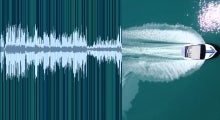Music in Airports: Response

Bring the Noise's recent article, Music for Airports, inspired two ER readers to document their own experiences with the soundscapes of what Marc Augé called "non-places." Augé's term refers to anthropological spaces of transience that do not hold enough significance to be regarded as "places". Other "non-places" include highways, hotel rooms, supermarkets, train stations, and bus terminals.
The original article focused on the soundscapes of airports in relation to Brian Eno's 1978 album Music for Airports. Edwin Porras documented the soundscapes near the San Pedro Terminal Station and opted to let the sounds speak for themselves. Nicole Andrew's documented her experiences with the sounds inside airports and wrote about the connection of the sounds to her feelings and experiences in each "non-place." Here are comments and excerpts of audio and video taken by both scholars.
Porras
I explored the sound of the fountain outside the San Pedro Terminal Station. This fountain automatically plays music in 10 minute intervals and without regard if anyone is listening. People might pass by as they work out or stroll down the length of the tramline. This terminal serves as hub for buses, boats, and trains.
Andrews
Inspired by the concept of consciously observing music in "non-places," I decided to record my findings during my international travels to Bulgaria and Berlin in the summer of 2015. Numerous connecting flights meant I got the opportunity to observe a number of different airports in various cities, including Los Angeles (LAX), Rome (FCO), Sofia (SOF), Vienna (VIE), and Amsterdam (AMS). I used my phone to collect the recordings, holding it as close to the music source as possible, and took a photo that was representative of the location.
I initially thought I would encounter much more music than I did. The vast majority of the airports I came through did not have music unless it was coming from a shop, and every shop had their own music.
One of the more interesting examples I found was in Sofia, where there was a piano next to departing gates, available for anyone to play. It so happened that I walked past as a man was playing. He stopped shortly after I finished recording to give a short lesson to one of his children. Other intriguing examples were a forest-themed lounge in Amsterdam, and by a large video of water falling, near baggage claims and customs in Los Angeles, which both had corresponding nature sounds.
I later identified the songs I recorded, which I have paired with their location and a short description of the setting:
1. LAX (Los Angeles). Airport, shopping center: "Telephone" - Lady Gaga feat. Beyonce
2. LAX (Los Angeles). Airport, shopping center: "Peace of Mind" - Above & Beyond feat. Zoe Johnston
3. FCO (Rome). Airport, just getting off my plane, standing near bathrooms and a bookshop: "Good Riddance (Time of Your Life)" - Green Day
4. FCO (Rome -> Sofia). Airplane: "Bye Bye Mon Amour" - Ludovico Eunaudi
5. SOF (Sofia). Airport, by my gate: "Fallen" - Blank & Jones with Delerium & Rani
6. SOF (Sofia). Same airport, closer to my gate: Beethoven Sonata No. 8 “Pathetique” (live)
7. SOF (Sofia -> Vienna). Airplane: "Visoko, Visoko" - FSB
8. VIE (Vienna). Airport, by luxury shops: "Aber Dich Gibt's Nur Einmal Fuür Mich" - Nilson Brothers
9. AMS (Amsterdam). Airport lounge: nature sounds
10. AMS (Amsterdam). Airport, restaurant area: "Amar Sin Condicion" - Maelo
11. LAX (Los Angeles). Entering baggage claim and customs: nature sounds
References
Augé, Marc. 1995. "Non-places: Introduction to an Anthropology of Supermodernity." London: Verso Press.
Nicole Andrews is an undergraduate student in the Department of Ethnomusicology at UCLA and has performed in the Department's Indian, Bulgarian, Bluegrass, and Gospel ensembles.
Edwin Porras is a graduate student in the Department of Ethnomusicology at UCLA focusing on the role of the corneta china in Cuban society.





